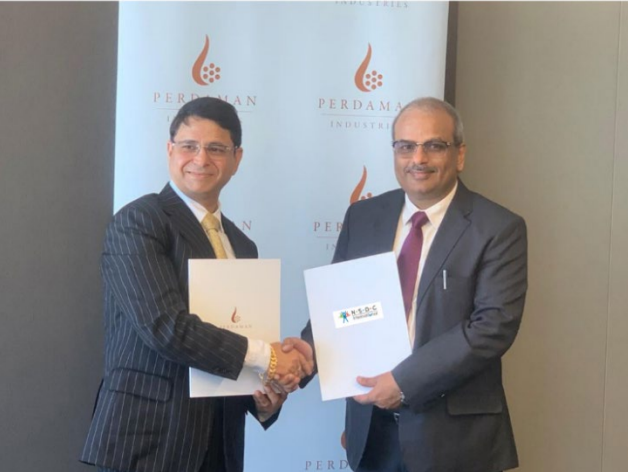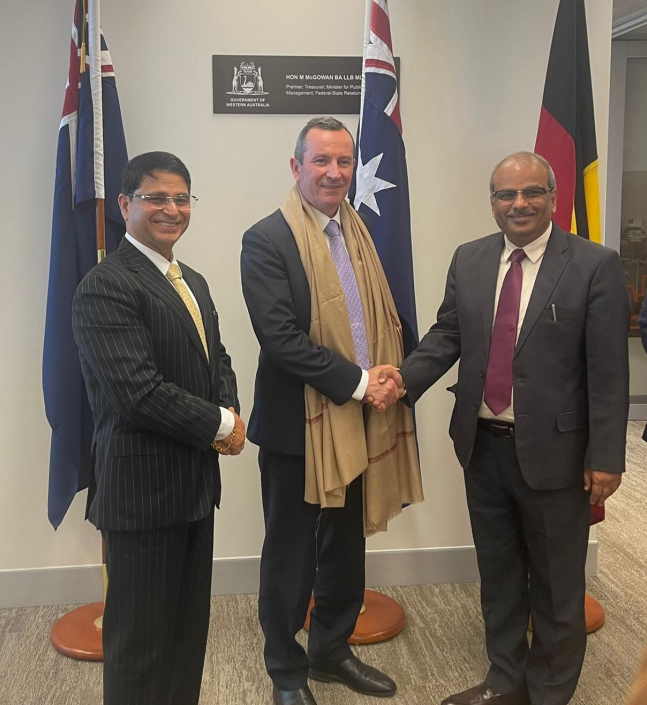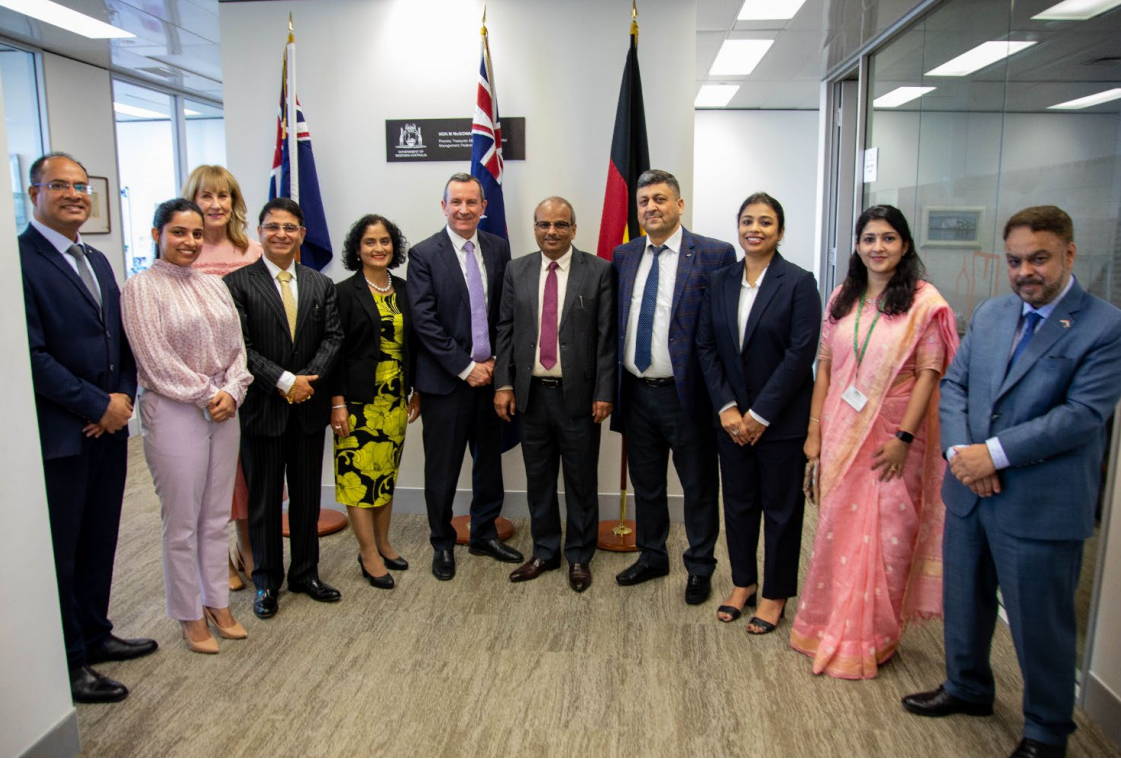NSDC International partners with Perdaman to enhance India Australia trade in
Innovation, Skills and Education
Western Australia, 28th October 2022: NSDC International (NSDCI) and Perdaman collaborated to bring
forth a new era of growth, prosperity, and alliance, to establish an ‘exclusive partnership to become a
Gateway to Australia for the Indian skilled and business community. The association will build the trust and
credibility. Both the companies have become a natural partner (partner of choice) due to their business
strength which align to provide synergies in delivering premium services aligned to their core values. This
agreement will lead to deeper cooperation between the two companies to foster the Australia and India
mutual co-operation. This association has envisioned a big dream and has come together to assist to build
the Australian economy and has set up the below pathways for success:
• Vision: Exclusive Platforms to address the high skill shortage that are currently impacting the growth
of Australia
• Mission: To continuously transform the Indian trade relationship through talent, finance capability and
to promote education to Australia
• Tagline: Building the Australian economy with Indian trade & talent
Under the leadership of Hon’ble Prime Minister of India Shri Narendra Modi, the Centre is taking great efforts in
skilling, re-skilling and upskilling its youth. The National Skill Development Corporation (NSDC) launched NSDCI
as a 100% subsidiary to play role in steering national and international partnerships for overseas employment
through specific programmes, positioning India as the preferred hub for the supply of skilled workforce across
the globe. The collaboration will also provide students from India/Australia with the opportunity to study in the
reciprocal country through various channels. Going forward, it would also explore the scholarship opportunity
and the possibility of a reduction of the fee for students coming from economically weaker backgrounds. The
association will work in various industry sectors including manufacturing, hospitality, agriculture, renewable
energy and electric vehicles.
Shri Ved Mani Tiwari, CEO, NSDC & Managing Director NSDC International visited Perth with the blessing
of Hon’ble Minister Pradhan to launch NSDC International with Perdaman in WA. The six (6) member delegation
met with the Premier of Western Australia, Hon Mark McGowan MLA. NSDC International “While India has a
huge network of training institutions consisting of Industrial Training Institutes (ITIs), Pradhan Mantri Kaushal
Kendras (PMKKs) and other institutions skilling millions of youths every year, Australia is facing an acute
shortage of skilled workers. As a result, there is an urgent need to create an enabling and facilitating
environment to benefit both countries. It is my firm belief that this partnership will not only make the process of
international mobility by a smooth process by removing any bottlenecks and procedural challenges but also
meet the aspirations of Indian youth to earn a livelihood in foreign countries.”
Chairman of Perdaman, Mr Vikas Rambal said “We welcome the Government of India’s initiative to build
stronger ties with Australia and they have chosen WA as a state to establish the network. This is a historic
moment for both the countries to have organisation like NSDC International to establish with local partner
Perdaman, for building the vision for the next generation of entrepreneurs and businesses.


Premier Mark McGowan welcomed the decision by Perdaman and NSDCI to establish the office in Western
Australia, and the opportunity to strengthen ties with India. Mr McGowan said, “My Government is committed to
enhancing our State’s already strong relationship with India, which is underpinned by common values, strong
people-to-people connections, and substantial trade and investment links. Earlier this year, our largest ever
business delegation travelled to India with a clear message – Western Australia is open for business and warmly
welcomes students, workers, visitors and investors.

India is the world’s largest democracy with a very young population, providing a demographic advantage all the
way to 2055. Under Skill India Mission, sustainable skills strategies have been developed in collaboration with
the government, industries, and education systems, transforming Indian talent and making the youth the code
for global prosperity today. This presents significant opportunities for Australian businesses, including in
education, agriculture, energy, and tourism, to attract skilled workers from India and bridge the acute skill
shortage that plagues the country. A close partnership between the two nations in the skill sector will not only
contribute to nation-building but also bring up to $100 billion in bilateral trade in the next eight years.
India has always placed Australia at the forefront of its international partnership with both governments
recognising the significant potential for further collaboration across a myriad of areas such as trade, defense,
education, and skill development. To further strengthen the diplomatic ties, Dharmendra Pradhan, Minister of
Education Skill Development and Entrepreneurship recently visited Australia to discuss deploying Australian
Skill Standards & Certification frameworks in India. During the meeting, Pradhan reiterated India’s interest in
collaborations with Australia’s skilling institutions by saying that India’s young demography is the biggest
strength in the 21st century and will contribute to the nation as well as the global economy.
The recently signed interim free trade agreement between India and Australia has become the base for
enhanced cooperation in investments and other strategic engagements. The comprehensive interim
agreement provides zero-duty exports to almost 100% tariff lines from India to the Australian market and 85%
imports from India. The pact, which is expected to be effective in about four months will eventually pave the
way for a full Comprehensive Economic Partnership Agreement (CEPA).
***
About National Skill Development Corporation
Giving boost to Government Skill India Mission, National Skill Development Corporation (NSDC), a nodal skill
development agency, working under the Ministry of Skill Development & Entrepreneurship (MSDE),
Government of India, is a unique Public Private Partnership (PPP) that aims to catalyse the creation of a large
and quality vocational training ecosystem in India. Since inception in 2010, NSDC has trained over three crore
people through its collaboration with training partners pan India.
NSDC has established 37 Sector Skill Councils (SSCs) and implements the Government’s flagship skill
development schemes such as Pradhan Mantri Kaushal Vikas Yojana (PMKVY), National Apprenticeship
Promotion Scheme (NAPS), among others. NSDC also funds enterprises, companies and organisations that
provide skill training. The organisation enables private-sector capacity building in skill development by offering
concessional loans, other innovative financial products, and strategic partnerships.
NSDC has launched NSDC International (NSDCI) with the sole purpose to create overseas employment
opportunities for skilled professionals. NSDCI is currently working with the Ministry of External Affairs and with
the Indian Mission abroad to advocate Indian’s strength as a country with abundant skilled professionals.
About Perdaman Global Services
Perdaman is a multinational group based in Western Australia with a long-standing track record in
involvement within a diverse range of markets. From investments in fertiliser production to help our farmers
produce crops, to the ownership and management of shopping centres that make wonderful experiences and
community hubs; from the production and distribution of pharmaceuticals to provide better healthcare, to
recruitment & migration services and advanced energy solutions, we are an innovative company that actively
seeks out new opportunities.
These are just some of the commercial aspects of Perdaman. Integral to this is our corporate culture of
creating leaders and growing together as a team, and all our operations are backed by extensive financial
services to ensure strength and growth. We are also highly involved in the community and actively give back –
from supporting local sporting teams to contributing towards better education. We do what we do with passion,
and we do what we do with a sincere desire to create a better tomorrow.
For Media Enquiries
Mr Abhay Kumar Singh (National Skills Development Corporation International)
E: abhay.singh@nsdcindia.org
M: +61 413 102 505
Ms Rashpal Kaur (Perdaman)
E: rashpal.kaur@perdaman.com.au
M: +61 477 722 620

